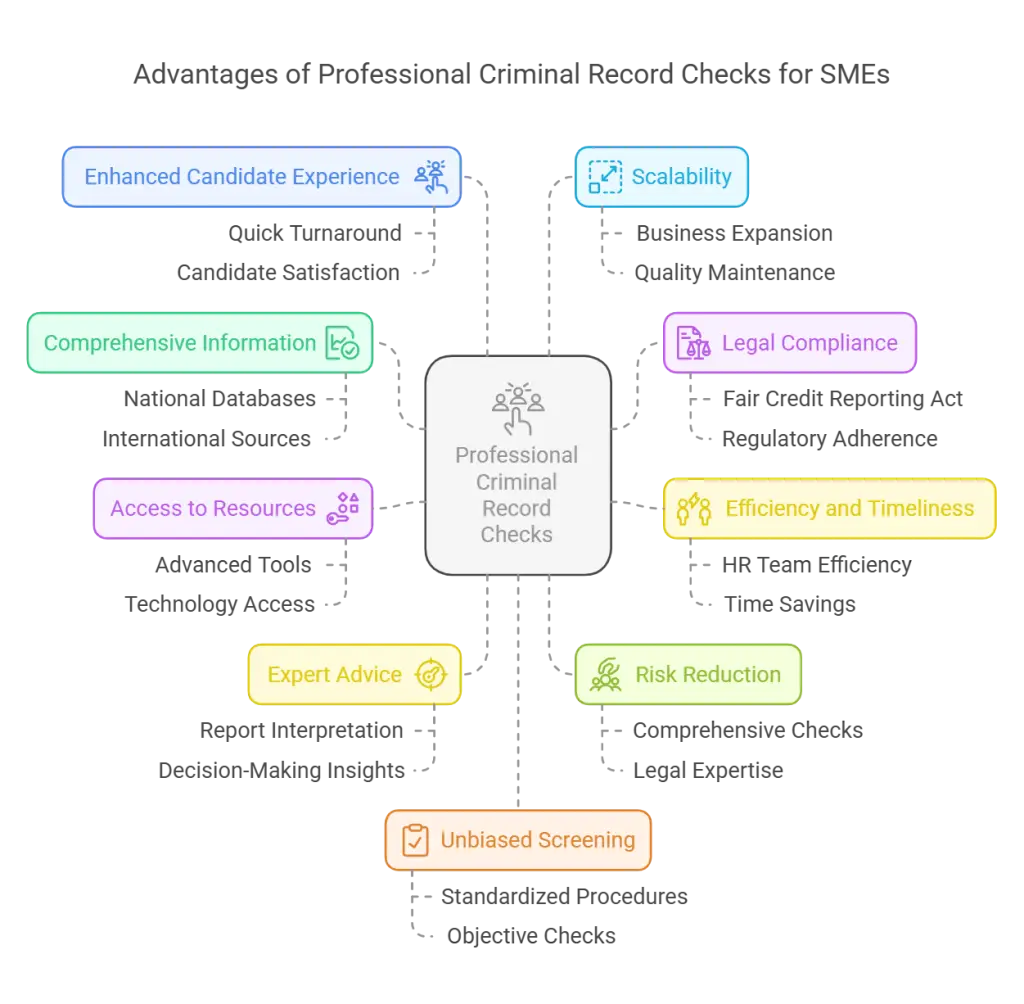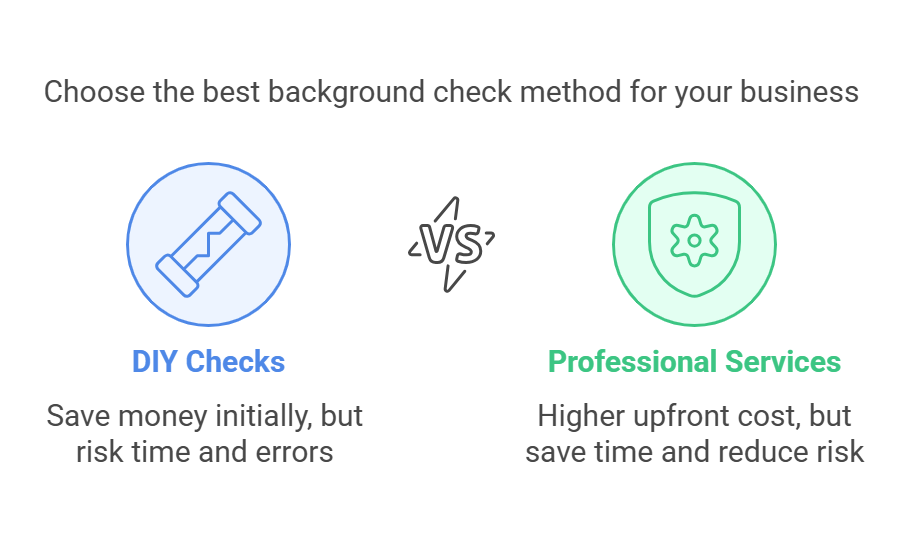Hiring the wrong person can be pricey. Workplace fraud alone costs U.S. businesses over $400 billion annually. Imagine what that means for a small business trying to keep margins low and productivity high. Your small or medium-sized enterprise (SME) can't afford mistakes. Criminal record searches aren't just good practice. They're necessary. Protecting your company from threats, ensuring a safe workspace, and filtering out potential liabilities—all hinge on thorough screening.
For SMEs, every employee counts, and the risks from unchecked hires can be disproportionately damaging. Is it better to do it yourself or hire experts for criminal checks? By weighing these options, HR and compliance officers like you can make the right call. You'll gain insight into deciding what's best for your team and the bottom line.
Key Takeaways
- Hiring mistakes can be costly, with workplace fraud costing U.S. businesses over $400 billion annually.
- Conducting criminal record checks is essential for protecting your business, ensuring workplace safety, and minimizing risks from potential hires.
- Although a DIY approach to background checks may seem cost-effective, it often leads to incomplete data, legal risks, and negative candidate experiences.
- Professional background check services provide thorough and compliant checks, saving time and reducing the risk of hiring errors.
EXPERT INSIGHT: Ever faced the choice between a pricey, high-quality item and a cheaper, less durable one? While the latter saves money upfront, the former often proves a better investment over time. SMEs face a similar decision with background screening. Opting for comprehensive, higher-quality checks ensures reliable results and long-term value. Read on to learn how investing in thorough background checks can lead to smarter business decisions. - Emile Garcia, SHRM-SCP, CHRP, CHRBP
Understanding the Legal Landscape
Conducting criminal record checks in the U.S. involves several legal considerations. The Fair Credit Reporting Act (FCRA) is central to this process. This federal law governs how employers can use consumer reports, which includes criminal records, in hiring. The FCRA requires your company to get the applicant’s permission before obtaining a report, and you must inform them if the report influences your hiring decision.
Another key aspect is data privacy regulations, which vary by state. States like California have stricter laws limiting what information can be used and how long records can be kept. A 2020 BJS survey of state criminal history systems found that 30% of states reported delays in processing court dispositions, leading to incomplete records and compliance risks. Staying updated on state-specific regulations is critical to avoid legal exposure.
Adhering to legal requirements is crucial. Non-compliance can lead to financial penalties like the FTC's $4.5 million settlement for FCRA violations, while inaccuracies in DIY checks have been shown to produce false positives in 50–60% of cases. More importantly, following these laws helps maintain a fair and unbiased hiring process. It builds trust with applicants by respecting their privacy and rights.
Managing these legal complexities can be challenging for small and medium-sized enterprises (SMEs). SMEs often lack the legal resources that larger corporations have. Limited expertise makes it harder to keep up with changing laws and ensure compliance.
How do you navigate a legal landscape that demands both precision and respect for privacy? Consider enlisting professional help or investing in training to educate your team on the essentials. Remember, understanding the legal side of background checks is not just compliance—it's about protecting your business and creating a responsible hiring environment.
The DIY Approach: Pros and Cons
Deciding between a DIY approach and hiring professionals for criminal record checks can be confusing. Let's break down the pros and cons of doing it yourself.
| Pros | Cons |
|---|---|
| Perceived Cost Savings Handling background checks in-house may seem cheaper, but consider the man-hours. Is your HR team ready to spend hours or even days digging? | Time-Consuming and Resource-Intensive Handling background checks in-house demands significant time and resources. Small businesses often juggle multiple responsibilities, and tasks like data gathering, verification, and cross-referencing can drain productivity. |
| Direct Control DIY gives you full control over data and decisions. But, does your team have the skills to manage this effectively? | Risk of Inaccuracy DIY background checks often rely on limited access to databases. Public records and online resources can be outdated or incomplete. A 2024 study in Crime & Delinquency found that 60% of regulated private-sector background checks contained false-positive errors, while 50% had false negatives, highlighting risks of DIY methods. |
| Legal Missteps Navigating the legal landscape of background checks requires expertise. Compliance with privacy laws and the Fair Credit Reporting Act is crucial. Missteps can lead to lawsuits, financial loss, and reputational damage. | |
| Limited Databases DIY checks usually cover local records but often miss out on broader, nationwide searches. This gap can overlook crucial information about candidates from different regions. Comprehensive checks require extensive resources that DIY methods lack. | |
| Interpretation Challenges Background check results can be complex. Proper interpretation is crucial. Without expertise, your team may misread data, leading to poor hiring choices. Professional interpretation ensures accurate decisions. | |
| Negative Candidate Experience Slow processes can frustrate potential hires. Delays in obtaining results may harm your candidate relations. A drawn-out background check process can deter talented individuals. An efficient, timely approach is more appealing to top candidates. | |
| Potential for Bias In-house checks can unintentionally introduce bias. Proper handling is critical to avoiding discrimination claims. A Harvard University study found that applicants with criminal records were 50% less likely to receive callbacks, with Black applicants facing compounded discrimination, underscoring the need for standardized professional screening. |
The Professional Approach: Pros and Cons
Professional criminal record checks come with a basket of advantages that make them an attractive option for SMEs.

Pros
A key benefit is comprehensive information. Professional services dig deep, accessing extensive databases that include national and international sources. The 2018 BJS Survey of State Criminal History Systems revealed a 51.5% surge in fingerprint-based civil background checks from 2008–2018, driven by employers’ need for comprehensive vetting.
Legal compliance is another crucial advantage. By outsourcing, you ensure adherence to regulations like the Fair Credit Reporting Act, mitigating risks of lawsuits or penalties. Professionals are well-versed in the legal framework, sparing you from the pitfalls of non-compliance.
Efficiency and timeliness are significant pluses. Instead of bogging down your HR team with tedious checks, professionals handle everything swiftly. This frees up valuable time for your team to focus on core business activities.
With professional services, you also gain access to resources. They have tools and technologies at their disposal that are far beyond what most SMEs can muster. This vast resource pool enhances the accuracy and depth of checks.
Expert advice is part of the package too. Understanding a criminal record report can be tricky. Professionals interpret results, offering clear insights and recommendations to help you make informed decisions.
Risk reduction tops the list of why SMEs should consider professional checks. The comprehensive nature of these checks, coupled with legal expertise, significantly lowers the chance of hiring mistakes.
Enhanced candidate experience is often an overlooked benefit. Efficient processing and quicker turnaround times ensure that your candidates aren’t left waiting, improving their overall experience with your company.
Professional services offer scalability. As your business expands, these services can easily adapt, handling increased hiring without compromising quality or speed.
Unbiased screening is an inherent advantage of using third-party providers. They rely on standardized procedures, ensuring every check is objective and consistent.
Finally, wider reach is a selling point. Professional services can perform nationwide or even international searches, something typically out of reach for DIY attempts.
Cons
Cost often concerns SMEs when considering professional checks. While it's true there's an upfront expense, you gain peace of mind. The return comes in the form of reduced legal risks and avoiding costly hiring errors.
Choosing professional services is an investment in peace and precision, sparing your business from unnecessary compliance headaches and potential pitfalls.
Cost Comparison: DIY vs. Professional
Running criminal background checks yourself might look cheaper at first glance. You may think you're saving, but let’s consider the hidden costs.
Time is money. DIY checks take hours of research and manual data entry. You also risk mistakes from incomplete or outdated data. Such errors can lead to costly hiring missteps or even lawsuits, with legal fees burning a hole in your budget.
Professional background check services offer clear pricing models. They often charge per report or package instead of variable fees. Some provide subscription options for frequent hiring needs, giving you predictable expenses.
Spending upfront on professionals might feel steep, but it pays off. They minimize risks by ensuring compliance with laws and regulations. They also save you time, which is valuable as you focus on growing your business.
Imagine hiring someone unfit for your company. The cost to replace them—recruiting, training, and lost productivity—can far outweigh professional service fees. A 2024 analysis by iprospectcheck cited a $26.5M negligent hiring verdict against a home healthcare provider after an employee with an undisclosed violent history committed murder.
Professional background check companies leverage advanced systems to provide competitive, value-driven solutions. They tailor their services to fit both your budget and needs, ensuring you don't pay for unnecessary extras.
This approach makes professional checks a wise investment. Long-term, you'll save yourself from potential financial pitfalls. Remember, reliable hires form the backbone of successful businesses.

GCheck: Your Partner in Compliant and Efficient Background Checks
GCheck stands out as a reliable ally for SMEs needing effective background screening. Our services are designed to simplify the process for you, ensuring compliance without the hassle. With GCheck, you get more than just a background check. You get confidence in your hiring decisions.
Key features of GCheck include fast turnaround times and detailed, comprehensive reporting. Our platform ensures that you receive accurate, legally compliant information swiftly. This efficiency not only saves you time but enhances your overall hiring process.
We know that SMEs often face resource constraints and unique challenges. GCheck addresses these by offering user-friendly interfaces and top-notch customer support. Our team is here to guide you through every step, making sure that the complexities of background checking are made simple and manageable.
Frequently Asked Questions
How to conduct criminal record checks?
Start by choosing a reputable background check provider or use state or federal databases if available. You need the individual's full name and consent before proceeding. Ensure you're following all legal protocols.
Best background check service for small businesses?
Look for services tailored to small businesses, like GoodHire or Checkr. They offer flexible pricing and user-friendly platforms. Read reviews and compare packages to find the best fit for your needs.
Cost of background checks for employees?
Costs vary based on the depth of the check. Basic checks might be $20-$50, while more detailed reports can go up to $100 or more. Volume discounts are often available for businesses.
Legal requirements for background checks in [location]?
These vary widely, so consult local laws or a legal expert. Many places require notifying applicants and obtaining consent. Some jurisdictions limit the use of certain data in hiring decisions.
Benefits of professional background checks for hiring?
Professional checks offer accuracy and efficiency. They help you ensure candidate honesty and reduce risks. Experts can also navigate legal complexities, saving you time and potential legal issues.
DIY vs professional background checks for employment?
DIY checks are cheaper but less reliable. They can miss important details and carry legal risks. Professional checks are thorough, legal-compliant, and more secure, offering better peace of mind.
How to choose a background check company?
Consider factors like compliance, turnaround time, cost, and customer support. Check if they cover all necessary areas, such as criminal records and identity verification. Read customer reviews for insights.
Affordable background check options for small businesses?
Opt for companies offering packages like Sterling or HireRight, which cater to small businesses. Prioritize what's crucial for your needs to avoid overpaying for unnecessary services.
How often should background checks be updated?
Regular updates depend on your industry and regulations. Many businesses update annually or when there's a role change. Stay compliant with any specific industry requirements.
Can background checks impact a candidate’s credit score?
No, background checks do not affect credit scores. They may include a credit report inquiry, but it's a soft check that doesn’t impact the score itself.
What should be included in a background check policy?
A clear policy should outline the types of checks conducted, frequency, consent procedures, and how results are used. Ensure it complies with all relevant laws.
Definitions
- Hiring Decision: Choosing whether to employ a job candidate based on qualifications, background checks, and company needs. A well-informed decision reduces risks and ensures a good fit for the role.
- Criminal Record Check: A review of an individual's past criminal history, conducted through databases and official records. Employers use this to assess potential risks before hiring.
- Legal Compliance: Following laws and regulations related to hiring, including background checks and data privacy. Non-compliance can result in fines, lawsuits, or reputational damage.
- Candidate Experience: A job seeker's perception of your company during the hiring process. Delays in background checks can frustrate candidates, affecting your employer reputation.
- Background Screening: A process that verifies an applicant’s history, including employment, education, and criminal records. It helps employers make informed hiring decisions while maintaining workplace safety.

GCheck Editorial Team
Meet the GCheck Editorial Team, your trusted source for insightful and up-to-date information in the world of employment background checks. Committed to delivering the latest trends, best practices, and industry insights, our team is dedicated to keeping you informed.
With a passion for ensuring accuracy, compliance, and efficiency in background screening, we are your go-to experts in the field. Stay tuned for our comprehensive articles, guides, and analysis, designed to empower businesses and individuals with the knowledge they need to make informed decisions.
At GCheck, we're here to guide you through the complexities of background checks, every step of the way.






